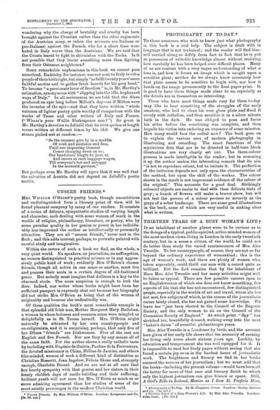UNSEEN FRIENDS.* Hits. Wir.Lram O'Bunor's pretty book, though unambitious and
undistinguished from a literary point of view, will be found pleasant company by many of our readers. It consists of a series of delicate, sympathetic studies of varying length and character, each dealing with some woman of mark in the
worlds of religion, philanthropy, literature, or poetry, who by some peculiar quality in her genius or power in her individu- ality has impressed the author as intellectually or personally attractive. They are all "unseen friends," never met in the flesh ; and this adds interest, perhaps, to portraits painted with careful study and imagination.
Within the covers of such a book we find, on the whole, a very quiet world. No speakers, no journalists, no suffragettes, no women distinguished in practical science or in any aggres- sively public kind of work ; evidently Mrs. O'Brien's chosen friends, though all active in one sense or another, must live and possess their souls in a certain degree of old-fashioned peace. But nobody must imagine that dullness is a key to the charmed circle. The mere suspicion is enough to lock the door. Indeed, one writer whose books might have been her sufficient passport is expressly shut out because her biography did not strike Mrs. O'Brien as being that of the woman of originality and humour she undoubtedly was.
Of these qualities the book's most remarkable example is that splendid old Irish nun, Mother Margaret Mary Hallahan, a woman in whom holiness and common sense were mingled as delightfully as in St. Teresa herself. Mrs. O'Brien might naturally be attracted by her own countrypeople and co-religionists, and it is surprising, perhaps, that only five of her fifteen " friends " are Irishwomen. Five of the rest are English and five French. Nor are they by any means all of the same faith. For the author shows a really catholic taste by including with Eugenie de Guerin, Pauline de la Ferronnays, the devoted missionary in China, Helene de Jaurias, and others like-minded, women of such a different kind of distinction as Christina Rossetti, Jean Ingelow, Felicia Skene and, strangely enough, Charlotte Bronte. And we are not at all sure that her hearty sympathy with that genius and her sisters in their Lonely childish days of castle-building and their suffering, brilliant youth will not earn for Mrs. O'Brien as much as or snore admiring agreement than her studies of some of the most saintly personages in the modern Christian world.
• Unseen Priende. By Mrs. William O'Brien. London: Longmans and Co. Os. 6d. net)






































































 Previous page
Previous page